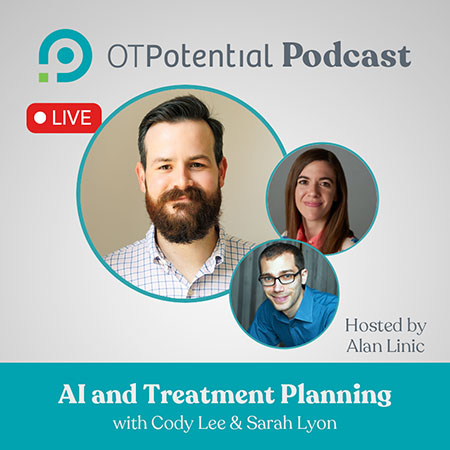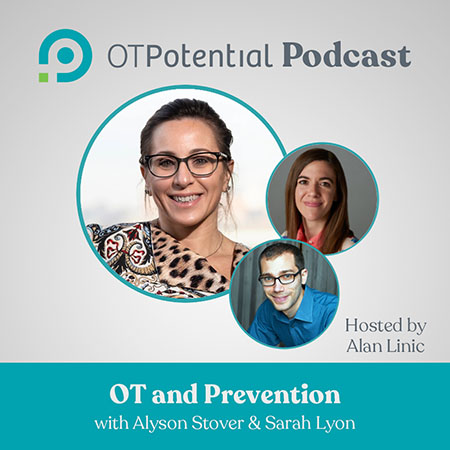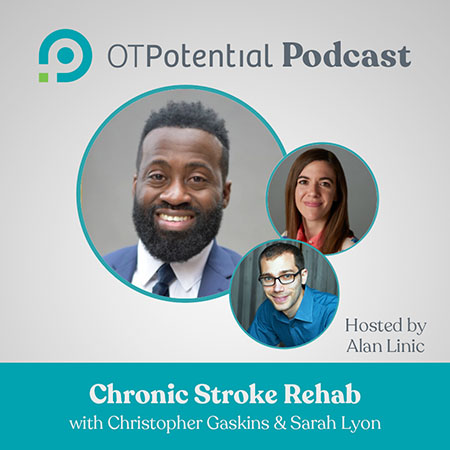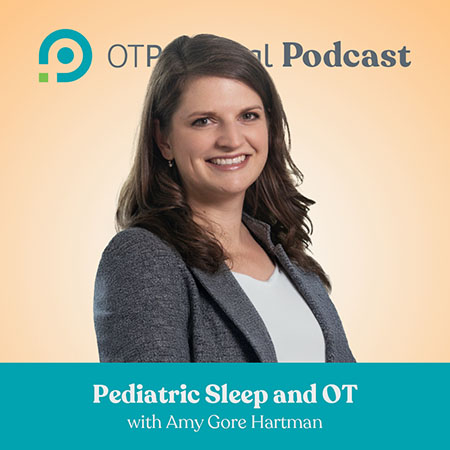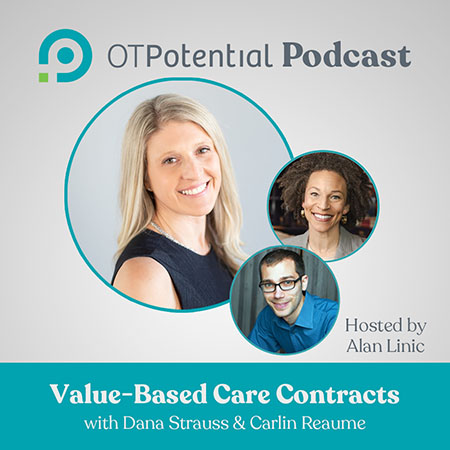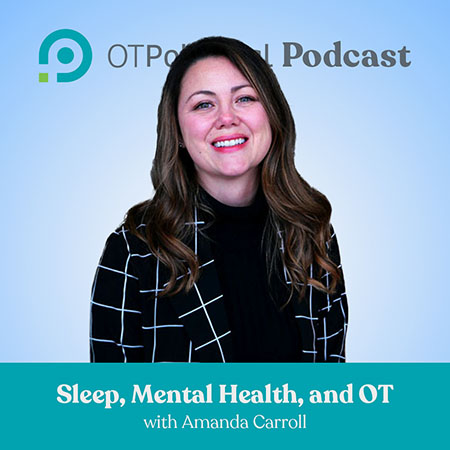Earn 1 hour of continuing education by joining OT Potential after taking this course.

Listen: Apple | Spotify | Google
The research we are discussing on this 1-hour episode really drives home the complex connection between depression and 3 neurodegenerative diseases:
- Alzheimer’s Disease
- Parkinson’s Disease
- Huntington Disease
Even though depression has a high comorbidity with all of these diseases, you’ll learn why it should not be an assumed part of the disease process. Instead, depression should be recognized as distinct and treated.
But, here’s where it gets super complex:
In some cases the medications traditionally used to help treat depression do not work for this population—and can be actively harmful. So, OT approaches like environmental enrichment and physical exercise could actually be the front line defense for helping these patients manage their depression.
To unpack all of this, I am so thankful to be joined on the podcast next week with dementia care expert, Rachel Wiley, MS, OTR/L, CDP.

Earn 1 hour of continuing education
1. Listen to the podcast for free.
2. Sign up for the OT Potential Club.
3. Pass the quiz and download your certificate!
Primary Journal Article Explored
When you log in, be sure to check out the OT Potential Club’s written breakdown of the following research article. Then, share your questions and thoughts with fellow practitioners.
Supporting Research and Journal Articles
- Occupational therapy for people with dementia and their family carers provided at home: A systematic review and meta-analysis
- Nonpharmacological interventions to improve depression, anxiety, and quality of life (QOL) in people with dementia: An overview of systematic reviews
Learning Objectives
- You will be able to recognize the evidence-supported OT interventions for depression in Alzheimer’s.
- You will be able to identify the evidence-supported OT interventions for depression in Parkinson’s and Huntington’s Disease.
Agenda
Intro (5 minutes)
Breakdown and analysis of journal article (5 minutes)
- Quick intro to Major Depressive Disorder (MDD)
- Depression and Neurodegenerative Diseases
- What causes depression?
- What are the mechanisms behind neurodegenerative disease?
- Discussion
- Conclusion
- Takeaways for OT practitioners
Discussion on practical implications for OTs (with Rachel Wiley) (50 minutes)
- Tell us how you first found OT
- What drew you into dementia care and what are you doing now?
- What were your initial impressions of this article?
- Do you screen for and discuss depression symptoms and suicidal ideation with patients?
- Exercise was mentioned consistently as a treatment option. How can OTs address exercise with patients?
- The article also mentioned “environmental enrichment” multiple times as a treatment option- what opportunities do you see for OTs there?
- Do you talk about sleep and diet with your patients?
- Depression is difficult to talk about. How can we support carepartners when their loved one is experiencing depression + a neurodegenerative disease?
- What practical advice do you have for taking a multidisciplinary approach to complex situations, like we’ve talked about today?
- Are there any other considerations for OTs working with patients with depression in neurodegenerative diseases that were not mentioned in the article?
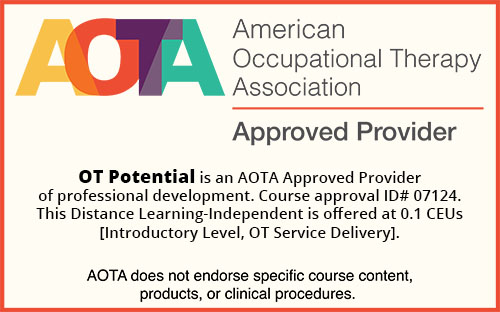
Instructional Methods/Registration/Special Needs Requests/Cancellation Policy
This course is an independent/self-study course delivered via podcast on iTunes, Spotify, Google Play & more.
If you need accommodations to take this course, please contact us and we will address your needs on an individual basis.
If we cancel a promoted course, event, live stream, or any other paid CEU offering prior to release, and you subscribe explicitly for said offering, you are eligible for a full refund if you did not complete and earn any other CEU quizzes or certificates during your subscription.
If a live webinar is cancelled that you signed up for, our system will automatically generate an email to you and if possible, we will inform you of the rescheduled date. Our most current webinar schedule will be found at: otpotential.com/live-ot-ceu-webinars.
Course Completion Requirements
In order to receive a certificate for this course, you must first participate in the podcast/webinar in its entirety. Then, you will need to take the quiz that will accompany the course and earn 75% or higher. If you pass, a certificate will be automatically generated and sent to your email. Quizzes for live (distance learning–interactive) webinars must be completed within 3 days of completing the webinar.
Target Audience/Educational Level
Our target audience is occupational therapy practitioners who are looking to learn about Depression in Neurodegenerative Diseases. The educational level is introductory.
Financial and Non-financial Disclosures
It is the policy of OT Potential to disclose any financial and non-financial interest the provider or instructor may have in a product or service mentioned during an activity. This is to ensure that the audience is made aware of any bias of the speaker.
We here at OT Potential have no financial stake in this topic. Our guest, Rachel Wiley, does teach the Skills 2 Care dementia program for which she takes a salary from the Dementia Collaborative.
Speakers
Rachel Wiley, MS, OTR/L, CDP

Rachel is an occupational therapist and the founder and owner of Day By Day Dementia Consulting and the Dementia Collaborative LLC. Rachel is certified in Skills2Care® for caregivers of individuals living with dementia, and she is a Certified Dementia Practitioner.
Rachel attended Penn State University for her Bachelor’s in Rehabilitation and Human Services and minor in Psychology and attended Thomas Jefferson University for her Master’s of Science in Occupational Therapy. Read full bio.
Sarah Lyon, OTR/L

Sarah’s passion is helping fellow OT practitioners translate evidence into daily practice. Sarah earned her BA in religion from St. Olaf College, then earned her master’s degree in occupational therapy from New York University in 2011.
Since then, she’s worked in numerous facilities, including a critical access hospital, an acute trauma hospital, and a state inpatient psychiatric hospital. Sarah is the founder/owner of OT Potential. Read more about OT Potential here.
This course was designed to meet your continuing education requirements
We designed the courses in the Club to meet the requirements for “online” and “independent/self-study” courses. To verify the requirements from your specific state (within the US), check out our post, OT Continuing Education Requirements. If you are outside of the United States and have questions, please contact us.
We are proud to be an AOTA Approved Provider and to meet the requirements for your NBCOT renewal.
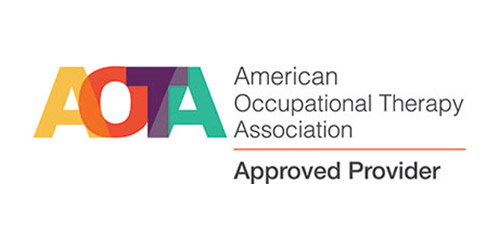

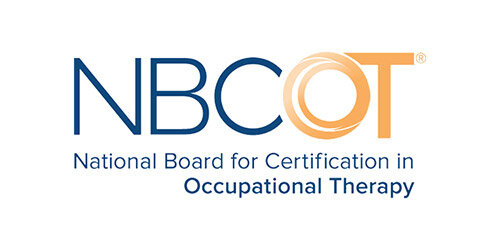
See our other OT courses!
Depression in Neurodegenerative Diseases • OT Potential
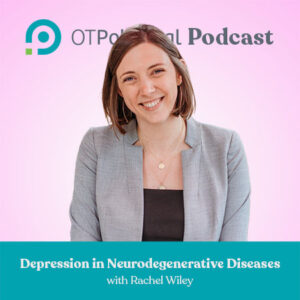
Today we’ll be covering “Depression in Neurodegenerative Diseases.” We’ll look at new research and discuss it with Rachel Wiley.
Course Provider: Organization
Course Provider Name: OT Potential
Course Provider URL: https://otpotential.com/
Course Mode: Online
Start Date: 2023-05-15
Duration: 01:00:00
Repeat Count: 5
Repeat Frequency: Yearly
Course Type: Subscription
4.83

